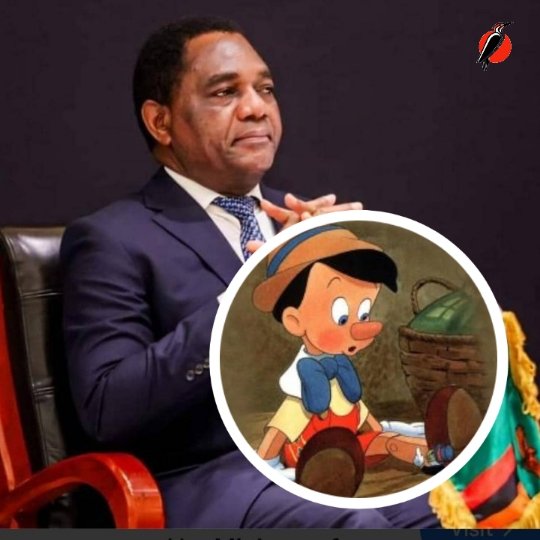
The UPND government exported the surplus maize it inherited from the PF regime, resulting in a critical shortage of mealie meal in most parts of the country.
“300 years after the birth of Adam Smith, we’re sharing plans for development (at a prestigious Panmure House) as we encourage investment and job creation for our people!” – Hichilema.
By Mpandashalo Mwewa | Chief Editor.
Lusaka, May 10 – President Hichilema’s statement in Scotland reeks of inferiority complex. Let’s examine it broadly by touching a few points that explain why a few African leaders still believe it’s a privilege to be in the midst of white people.
Key Points:
◾Zambia does not need Adam Smith nor does it need to consult economists at Panmure House to develop but solely the people of Zambia.
◾A small island without the resources Zambia is endowed with called the UK has a larger GDP than the whole of Africa combined.
◾What we got from Europe during colonial days was not education but training. We need serious education reforms to develop Zambia.
To imagine that a small island, the United Kingdom, without the natural resources that Zambia possesses, had a GDP of $3.066 trillion in 2014 larger than the whole of Africa combined at $2.7 trillion in the same year, confirms my assertions that we need a radical change of mindset to develop Zambia.
Instead of going to Scotland to beg for money, our Head of State must be busy at State House working out ways to monetize what we have in Zambia. Let’s make our own money by keeping ownership of our natural resources, processing them and exporting them as finished products. It’s as simple as that.
Also Read: Botswana threatens break-up with De Beers.
“I would rather argue, that we need to mobilise the right mindsets, rather than more funding. After all, in Africa, we have everything we need, in real terms. And yet we remain mentally married to the idea that nothing can get moving, without external finance. We are even begging for things we already have. That is absolutely a failure of mindset!” – Paul Kagame.
So, how did we get to this sort of dependancy syndrome? Allow me to use the example of the DRC.
When Belgian missionaries set out to Congo, now the DRC, King Leopold II instructed them to preach scripture ordering and encouraging their followers to love poverty, like “Happier are the poor because they will inherit heaven”.
He further reminded them to detach “negros” from everything which would give them courage to affront Belgians. The Missionaries went a step further. They gave us an education or was it???
Colonial education on which most of our current curricula are based, was not education, but training.
Its purpose was not to develop critical thinking minds that would help us understand the objective limits to the advancement of individual and collective welfare, but to train us to accept and live with our social economic development challenges.
This distorted education, which was meant to crop a docile African who would not raise a finger against his colonisers meant, in effect, detaching an African from reality.
This is why, to date, our political leadership still believes solutions to our various local social economic development challenges will come from international travels.
Our leadership ought to understand that poverty, which is our biggest enemy, according to sociologist Peter Townsend, is more than a lack of money.
Rather, it’s a complex spectrum of deficient social relationships and exclusion from a perceived normal life that impacts a person’s well-being; in our case, proper education that is centred on problem solving not looking for jobs or begging in Scotland.
The current political system, for instance, is filled with poverty striken voters and we know that people raised in poverty make poverty-prone decisions such as voting for someone who gives them handouts today and not one who can transform their future livelihoods and end up raising their children in poverty. It’s an unending cycle.
We will only address most of our social economic development challenges when we get political leadership with a right mindset promoting an education system that will prioritize critical thinking at individual level and move our society away from the current dependency syndrome that even our political leadership is suffering from.
Our current political leadership will continue with their retrogressive policy formulations because they have been trained by their Western sponsors to accept and live with our social economic development challenges and if possible even help sustain these limits and in an efficient manner. This is why:
◾President Hichilema tells us that Zambians can’t run the mines. Who told him it’s white people who go underground? And are we monkeys who cannot take up Finance or Management roles?
◾ZCCM-IH was asked to dispose off its ordinary shares in FQM against national interests and against our Constitutional provisions. Whose interests was he serving?
◾ZCCM-IH, for two years, has failed to publish audited financial results because Greg Mills, a foreigner, his friend, is said to have interferred with the completion of the valuation process of assets and liabilities related to the acquisition of 90% shares of Mopani leading to ZCCM-IH being suspended from the London Stock Exchange.
◾The new dawn government has introduced deductibility of mineral royalty tax for Corporate Income Tax calculations even though it was against the interests of an ordinary child in rural Zambia. The beneficiaries are the same corporate thieves who steal billions of US$ through complex tax evasion schemes and yet income in non deductible MRT policy was not much.
◾While ordinary Zambians are dying from curable diseases, the Minister of Health decided to quarantine essential medicines for public health institutions as she looked for better deals.
◾The list is endless…
These issues cannot be solved through the Head of State trotting around the world looking for Foreign Direct Investment. Our political leadership is being made to sustain these issues through the accolades they are showered with on these useless trips instead of attending to these Zambian issues which can only be solved by Zambians.
A crop of new leaders ought to realise that we truly need a radical change of mindset to develop Zambia because our issues are immense:
◾poverty,
◾government corruption,
◾lack of proper education,
◾poor health care,
◾nepotism and tribalism,
◾poor justice system,
◾stifling urbanisation that reduces production in rural areas and leads to greater unrest in the growing urban hives,
◾the list is, equally, endless…
This is why I think that what we need, to start with, is a national Indaba to devise a new home bred governance system that must prioritize development over politics of patronage. Because the current political system is nothing but a divide and rule one, designed to keep us busy fighting each other while the West feeds on our natural resources.
Also Read: A look at Kateka’s article: Zambia in a crisis.
The West knows that natural resources are managed through political decisions so they have concentrated on weakening our governance systems. It has never supported decolonised, open minds to be in political offices of influence, leaders willing to invest in critical thinking and, to a great extent, leaders who want to avoid passive acts such as begging.
Wherever this mindset starts to sprout, political chaos in whichever form emerges. Zambia is not an exception. How much did the Brenthurst Foundation pump into the UPND campaigns for its Director to be a Special Advisor to the President at State House?
We are not rich by what we possess but rather by our ability to grow our possessions from nothing with our minds and our hands. We need a crop of new leaders who must transcend this inferiority complex.
Woodpecker’s Digest is on Facebook. To follow our articles on Facebook, like our page by clicking HERE.
©2022 Woodpecker’s Digest Inc.
Putting news into perspective










Maybe we need to grow new brains as the present is misrepresenting us.
How does who call themselves modern leaders, come on the scene and are busy tingling the globe to excite investment, that only comes and bite us in our behinds?
Have gone through the article and appreciate it very well as it seeks to solve the challenges which we have been facing in Zambia and Africa atlarge.
Indeed poverty reduction solutions will not come from west or East but it should be homegrown solutions. Which currently missing in the country, we are busy politicking instead find solutions and change education curriculum that will speak into challenges we face as Africa.
However, I would ask woodpeckersdigest.com to find time and follow Harry Kalaba and his ideologies of homegrown solutions. If we support such people we can be rest assured that Zambia will not be the same.